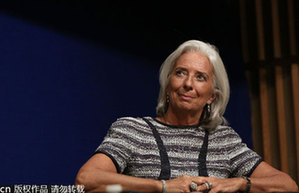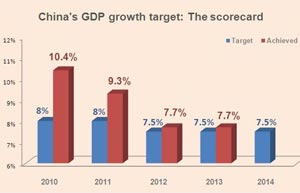WASHINGTON - Emerging economies are being challenged by an external environment that is less supportive compared with pre-crisis period and internal factors are also making growth slower in many countries, said the International Monetary Fund (IMF) in a new research on Thursday.
"In contrast to the favorable external environment that existed before the crisis, during the next few years, emerging economies will need to navigate through conditions that will be less conducive to growth," the IMF said in an analytical chapter of World Economic Outlook report released on Thursday.
On the one hand, emerging economies will be supported by higher growth in advanced economies even though it is accompanied by higher global interest rates.
On the other hand, the Fund noted, the expected slowdown in China and somewhat tighter external financing conditions will weigh on emerging economies growth.
China has become a key external factor for other emerging economies, it said. While its strong growth provided an important buffer during the global financial crisis, China's transition to a more sustainable but slower pace of growth will influence growth in other emerging economies.
The report listed two polar views on emerging economies' growth. Some argued that the slowdown in emerging economies is inevitable following years of rapid growth, helped by a favorable but ultimately transitory external environment characterized by high commodity prices and cheap external credit.
In contrast, others have argued that improved economic performance of the emerging economies was underpinned by structural reforms and strong macroeconomic policies.
"The reality could indeed lie somewhere between these competing views, wherein positive external conditions provided emerging market economies with the opportunity to strengthen their policies and reforms, and although growth may soften with the unwinding of these conditions, it will remain strong," said the IMF.
In an accompanying blog, writers of the report noted the recent slowdown in emerging economies appears to be as dependent on internal developments as those from abroad. And the priority for policymakers now is to "better understand the role of internal factors and assess whether there is scope for policies to improve these economies' resilience regardless of the external backdrop."
 |
 |
